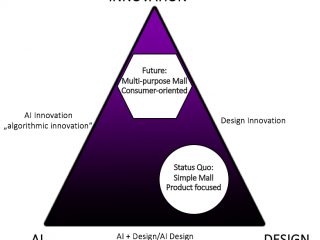More purposeful use of algorithmic innovations for getting a sustainability self-assessment tool
Case study of major fashion actors to raise AI design competences and responsible consumer integration to tackle the climate crisis.
We have ten years to protect ourselves from irreversible damage caused by the climate crisis, which requires more responsible consumerism to pursue systemic change. Currently, the leading pioneers of digital and algorithmic innovation in fashion, (AI fashion) actors, have been following short of using digital and algorithmic innovation for more sustainable and responsible consumption – they have still room for improvement when it comes to disaggregating value chains‘ emissions, thus making it unattainable to set a baseline to reduce them and stay below the 1.5-degrees Celsius limit by 2030. On the contrary, a first analysis suggests that most AI fashion actors have been applying digital technologies and algorithmic innovation to nudge their customers to consume more, faster thus encouraging overconsumption and expanding their total global emissions.
This thesis calls on AI fashion actors to adapt their algorithmic innovations (ALIN) based on data from customers‘ sustainability orientation to align with the SDGs by encouraging responsible consumption and production. ALIN is defined here as newly introduced (combinations of) deployed problem-solving algorithmic technologies. In this context, the research question is: Do AI fashion actors collect user data from their sustainable customers to use their ALIN along the SDGs? How can they assess their orientation towards the SDGs? The thesis conducts a multiple embedded case study of AI fashion actors to test this hypothesis. The results confirm that they do not use their technologies reflexively in line with the SDGs, as user datasets for sustainable ALIN do not yet exist. Further, this evaluation receives qualitative validation from (AI) experts who were interviewed for an economic assessment of the state of sustainable algorithmic innovations.
Based on the case study‘s findings, a sustainability self-assessment tool based on, among others, OECD‘s AI principles is proposed that enhances the sustainable AI design competence of AI fashion actors by critically reflecting on their customer data collection and how to adapt them for the SDGs.



